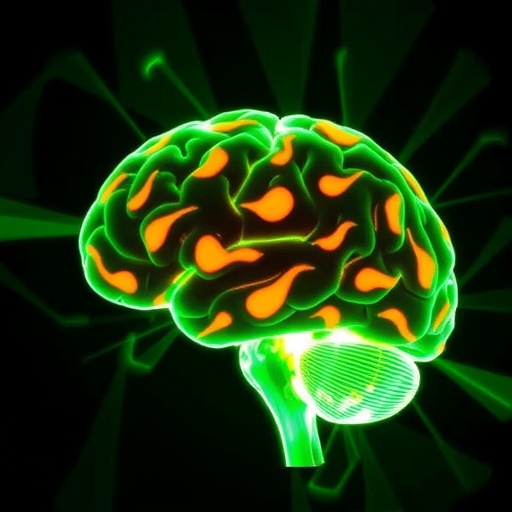In a groundbreaking leap forward in protecting the cognitive health of brain cancer patients, scientists at the University of California, Irvine, have discovered a novel approach to mitigate the devastating effects of cranial radiation therapy on memory and cognition. While radiation remains an indispensable tool in eradicating malignant brain tumors, the neuro-inflammatory side effects commonly lead to irreversible cognitive impairments in a significant portion of survivors. Up to 70% of these individuals endure persistent difficulties with memory and concentration, fundamentally undermining their quality of life and long-term independence. This new research offers a compelling hope to shield the brain without compromising the efficacy of cancer treatment.
The crux of this innovative therapy involves precisely targeting an immune pathway deep within the brain, known as the complement cascade. This cascade is part of the innate immune system’s response to injury and infection, but when overactivated during radiation treatment, it can exacerbate neuroinflammation and accelerate cognitive decline. UC Irvine’s research team, led by Dr. Munjal Acharya, PhD, identified the complement protein C5a and its receptor C5aR1 as critical mediators in this process. By inhibiting the interaction between C5a and C5aR1, the researchers were able to preserve cognitive functions in irradiated animal models effectively.
Using a multifaceted approach, the team employed both genetic and pharmacological methods to block the C5a-C5aR1 signaling pathway. The genetic method utilized a transgenic mouse model where the C5ar1 gene was knocked out, preventing the receptor’s expression entirely. In parallel, a pharmacological strategy employed PMX205, a small-molecule inhibitor known for its oral bioavailability and ability to penetrate the blood-brain barrier. Remarkably, both approaches improved memory retention and cognitive performance in mice subjected to cranial radiation, directly addressing the central challenge of therapy-induced neurotoxicity.
Equally significant was the observation that neither genetic deletion of C5aR1 nor PMX205 administration interfered with radiation’s tumor-killing effects. This delineation establishes a crucial therapeutic window—offering neuroprotection without diminishing anti-cancer efficacy. Such specificity marks a pivotal shift from broad-spectrum anti-inflammatory approaches, which risk compromising immune defenses and, by extension, cancer control. The study underscores the promise of molecular precision in reconciling the dual demands of effective treatment and quality of life preservation.
The clinical potential of PMX205 is particularly exciting given its ongoing evaluation in human trials for amyotrophic lateral sclerosis (ALS). Led by Dr. Trent Woodruff at the University of Queensland, early phase studies confirm the drug’s safety profile, with no reported toxicity or adverse reactions. This translational advantage accelerates the timeline for potential deployment in brain cancer therapy settings. The drug’s ability to traverse the blood-brain barrier, a notorious obstacle for many therapeutic molecules, further enhances its appeal as a neuroprotective agent in oncological contexts.
Future investigations spearheaded by Dr. Acharya’s lab aim to deepen the clinical relevance of these findings by employing more sophisticated brain cancer models. These include genetically engineered mouse models and patient-derived xenografts that more accurately replicate human tumor biology. Moreover, the team plans to explore the efficacy of PMX205 in combination with standard-of-care treatments such as temozolomide chemotherapy and fractionated radiation dosing regimens. This comprehensive approach intends to mirror real-world therapeutic protocols and optimize the drug’s utility in diverse clinical scenarios.
Personalized medicine emerges at the forefront of this research, as selective targeting of the C5aR1 pathway opens avenues for tailoring neuroprotective interventions based on individual patient risk profiles. By identifying patients most vulnerable to cognitive decline post-therapy, clinicians could administer C5aR1 inhibitors preemptively or concomitantly with cancer treatments. This strategy embodies the principles of precision oncology—not only eradicating tumors but also thoughtfully preserving neurologic function.
This promising line of inquiry also dovetails with parallel research on neurodegenerative diseases. Collaborator Dr. Andrea Tenner’s work in Alzheimer’s disease models highlights a shared mechanistic thread implicating the complement cascade in neuroinflammation-driven cognitive decline. The cross-pollination of findings from oncology to neurology exemplifies a broader trend of integrated molecular approaches to tackle complex brain diseases.
What makes this discovery truly viral worthy is its potential scale of impact. Millions of brain cancer survivors worldwide face the harsh reality of post-treatment cognitive deficits. The prospect of a safe, orally administered drug that can prevent such decline without hindering tumor control stands to revolutionize survivorship care. It represents a beacon of hope that state-of-the-art molecular science can grapple with one of medicine’s thorniest trade-offs—effectiveness versus long-term quality of life.
In sum, the UC Irvine study marks a transformative moment in neuro-oncology. Through innovative targeting of the complement pathway, researchers have unveiled a therapeutically actionable mechanism to safeguard cognition. This leap not only enriches the landscape of cancer treatment but also offers a blueprint for how targeted immune modulation can harmonize aggressive tumor control with compassionate preservation of brain function. As this research progresses from bench to bedside, it holds the promise to rewrite the narrative of survivorship for brain cancer patients globally.
Subject of Research: Animals
Article Title: C5aR1 inhibition alleviates cranial radiation-induced cognitive decline
News Publication Date: 14-Oct-2025
Web References: https://aacrjournals.org/cancerres/article/doi/10.1158/0008-5472.CAN-24-4869
References: PMC article on cancer survivors’ cognitive impairment: https://pmc.ncbi.nlm.nih.gov/articles/PMC8713760/
Image Credits: UC Irvine School of Medicine/Matthew Millwer
Keywords: Cancer treatments, cranial radiation, cognitive impairment, complement cascade, C5aR1 inhibition, PMX205, brain cancer therapy, neuroinflammation, neuroprotection, precision medicine




